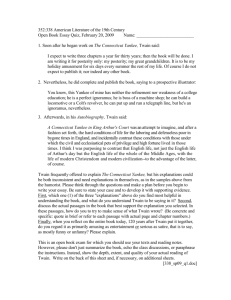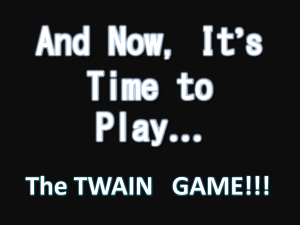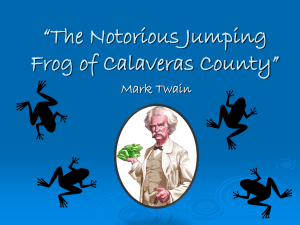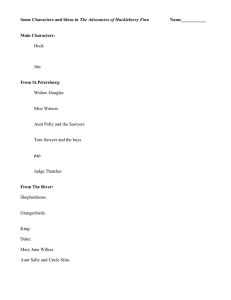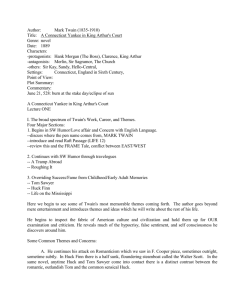Paul Oxborrow Dr. Obermeier ENG 200 1 May 200
advertisement
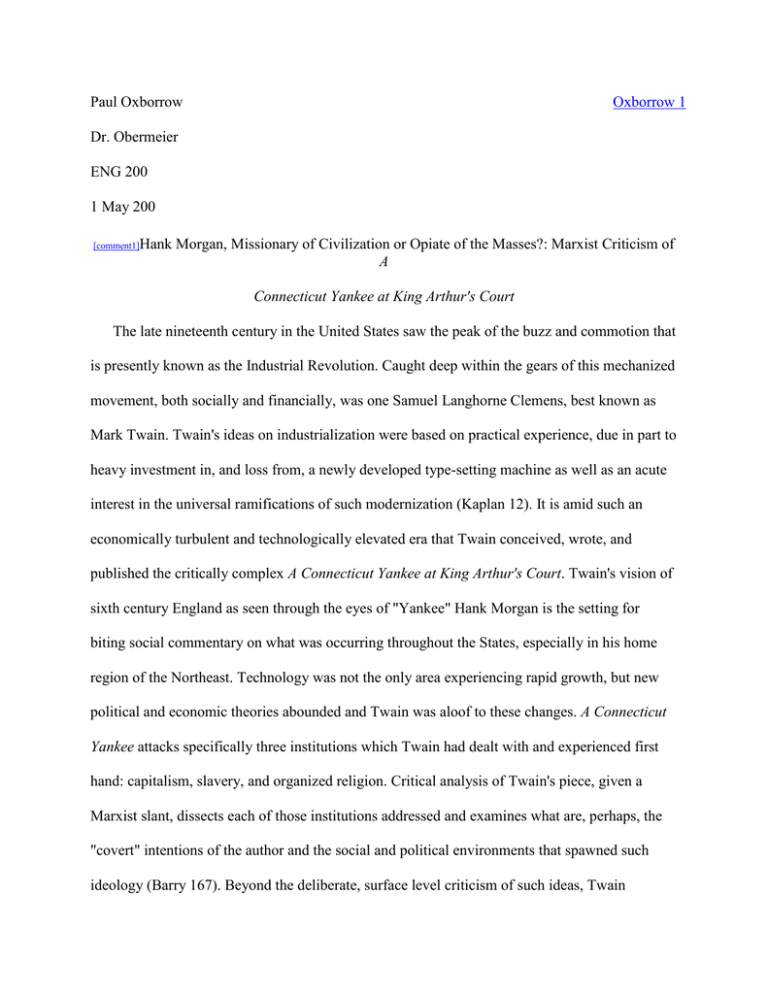
Paul Oxborrow Oxborrow 1 Dr. Obermeier ENG 200 1 May 200 [comment1]Hank Morgan, Missionary of Civilization or Opiate of the Masses?: Marxist Criticism of A Connecticut Yankee at King Arthur's Court The late nineteenth century in the United States saw the peak of the buzz and commotion that is presently known as the Industrial Revolution. Caught deep within the gears of this mechanized movement, both socially and financially, was one Samuel Langhorne Clemens, best known as Mark Twain. Twain's ideas on industrialization were based on practical experience, due in part to heavy investment in, and loss from, a newly developed type-setting machine as well as an acute interest in the universal ramifications of such modernization (Kaplan 12). It is amid such an economically turbulent and technologically elevated era that Twain conceived, wrote, and published the critically complex A Connecticut Yankee at King Arthur's Court. Twain's vision of sixth century England as seen through the eyes of "Yankee" Hank Morgan is the setting for biting social commentary on what was occurring throughout the States, especially in his home region of the Northeast. Technology was not the only area experiencing rapid growth, but new political and economic theories abounded and Twain was aloof to these changes. A Connecticut Yankee attacks specifically three institutions which Twain had dealt with and experienced first hand: capitalism, slavery, and organized religion. Critical analysis of Twain's piece, given a Marxist slant, dissects each of those institutions addressed and examines what are, perhaps, the "covert" intentions of the author and the social and political environments that spawned such ideology (Barry 167). Beyond the deliberate, surface level criticism of such ideas, Twain intertwines the fantastic foreground of a fictional tale with much of his own personal belief masked by the brilliant and brutal society artificially crafted by the protagonist and political mouthpiece, Hank Morgan. The setting of A Connecticut Yankee in King Arthur's Court, sixth-century England, is not one naturally conducive to the economic and political products of capitalistic rule. However, as Henry Nash Smith states in his Fable of Progress, "this medieval setting is obviously not meant to represent any actual place or time. It's a backdrop designed to allow a nineteenth-century American industrial genius to show what he can do with an underdeveloped country" (36). With a neutral setting established and a familiar plot based on Sir Thomas Malory's legendary Morte d'Arthur, Twain creates an idyllic arena for his exploration of the effects of capitalism on a relatively "primitive" society. Once Hank adjusts to his new surroundings, he sets at once to develop a new democratic, capitalistic republic, so that he might "boss the whole country inside of three months" (Twain 50). Twain was intimately acquainted with the ins and outs of capitalism. He had experienced an admirable standard of living due to his writing, but knew poverty as a child and bankruptcy with the aforementioned failed investment later in life. With this in mind, Twain uses Hank and his financial prowess to exemplify both the advantages and ills of a free-trade economy. This "doctrinaire didacticism" (Baldanza 118) is manifest in Hank's theoretic and specific explanations of "income versus cost of living" to the local working class, which efforts are proven futile. In Fulton's Ethical Realism, he adroitly addresses this scene: "For all his nineteenth-century intelligence, Hank spoils the banquet that would celebrate the ultimate truth about labor and wages: the right to enjoy the fruits of one's labor" (104). Also found in the same aptly titled Chapter 33, "Sixth-Century Political Economy," are hints of Twain delving into almost purely socialistic ideas with the description of modern labor unions and a debate over minimum-wage. The detailed and explicit style of this chapter could well be Twain's personal "manifesto" on such issues. Twain sneaks enterprising ideals into A Connecticut Yankee from beginning of the book. This is exemplified, as Richard Slotkin states in Mark Twain's Frontier, Hank Morgan's Last Stand, by Hank's insistence on the knight's adopting advertising banners for hygienic items aimed a general populous which neither reads nor uses the products (121). Slotkin sees the political agenda of Twain as "meant to contrast the progressive spirit of nineteenth-century American values with the regressive ideologies of traditional aristocracy, political monarchism, and established religion" (121). Even such ironies as a newspaper to an essentially illiterate population sprout from Hank's dually fueled fire of socialistic well-meaning and capitalistic greed. The eventual self-destruction of what has come to be an ideal political state is comes from this dueling sense of duty. When Hank destroys the factories and, in a sense, civilization, he does so in an effort to save what is left of the country from what were originally created for its well being. David R. Sewell suggests Hank as either a "progressive hero [. . .] sabotaged by reactionary forces" or "an authoritarian, proto-fascist," both connote his total influence on that era due mainly to his radically reformative capitalistic ideologies (Sewell 142). It is no mystery how Twain's life, especially his childhood along the Mississippi River, evolved and revolved around the issue of slavery. Critics have long debated the ambiguity of Twain's classic Huckleberry Finn and A Connecticut Yankee offers similar room for debate. Twain devotes four chapters to the enslavement and eventual freedom of Hank and a disguised King Arthur. "Slaves! The word had a new sound - and how unspeakably awful!" cries Hank upon the decree that both he and the king are to become the property of someone else (319). The ensuing pages relate the horrors the pair face as stories and ideas of slavery "take a meaning, get to be very vivid, when you come to apply them to yourself" (319). Once Hank has been subjected to the inhumane existence of a slave he demands that the king abolish slavery upon their rescue. This comes as an open renunciation of slavery, especially for those who have witnessed the atrocities that accompany it firsthand, yet also hints toward in ignorance-based excuse for proponents of slavery. Twain's personal experience growing up in the South no doubt molded his conception of the evils of slavery, yet also afforded him the ability to honestly and objectively look at the issue from the other side, without coming to agree with it. Perhaps, in a Marxist perspective, Twain's continual use of slavery as an issue in his works, throughout A Connecticut Yankee and beyond, represents his inner-struggle with the issue himself. "He seemed to think that both the human situation and the humans who could do nothing about it left nearly everything to be desired" (Schmitter 7). Of all the issues touched upon in this paper, none is as blatantly attacked as the age-old scapegoat, organized religion. Hank Morgan, from the beginning, openly decries the "concentrated power" and "political machine" that Catholic Church (160) and later his "project" to "overthrow the Catholic Church and set up the Protestant faith on its ruins--not as an Established Church" (365). "I was afraid of a united Church; it makes a mighty power, the mightiest conceivable, and then when it by-and-by gets into selfish hands, as it is always bound to do, it means death to human liberty, and paralysis to human thought" (102). Twain was not tinkering with novel ideas behind the mask of Morgan. It is well documented that he was opposed to powerful, organized religion and such a quote could have as easily been taken from his personal notes. In fact, Smith writes, "A reviewer of A Connecticut Yankee for the Edinburgh Scots Observer called the book a Îlecture' in dispraise of monarchial institutions and religious establishments as the roots of all evil" (73). Twain's attack on established religion was not all- encompassing. In fact, he gives a slightly compassionate nod toward those earnest members of religious groups, specifically some priests of that era: "Not all priests were frauds and selfseekers, but that many, even the great majority, of these that were down on the ground among the common people, were sincere and right hearted and devoted to the alleviation of human troubles and suffering" (160). Hank also speaks approvingly of a fragmented, non-denominational Protestant "go-as-you-please" style church (365). However, the overall tone is clear: The separation of church and state is essential in maintaining the freedom of the individual. Ironically, Hank's downfall is due in a big part to the scheming of the Church, the very organization he so openly opposed, and the Interdict it decrees throughout the land. Hank Morgan's industrialization of sixth-century England can be treated as both symbolic of progress and characteristic of corruptive imperialism. Hank's determination to shift national focus from religion and superstition toward technology is either an amazing venture in capitalism or simply a repackaged, fiscally sound "opiate of the masses." Mark Twain's roots in the South show through as he jabs at all things aristocratically established, from religion to slavery. In a sense, "A Connecticut Yankee could be taken as the expression of an international crusade for democracy," with a support for both industrialization and free enterprise (Smith 76). However, Twain's personal experiences give away the cautionary tone toward such a generalization of his outlook towards humanity, which, if A Connecticut Yankee serves as an archetype for the human race, appears dismally accurate. Works Cited Baldanza, Frank. "Connecticut Yankee." Mark Twain: A Collection of Criticism. Ed. Dean Morgan Schmitter. New York: McGraw-Hill, 1974. 117-121. Barry, Peter. Beginning Theory. Manchester and New York: Manchester UP, 1995. Fulton, Joe B. Mark Twain's Ethical Realism: The Aesthetics of Race, Class, and Gender. Columbia and London: U of Missouri P, 1997. Kaplan, Justin. Introduction. A Connecticut Yankee at King Arthur's Court. By Mark Twain. London: Penguin, 1986. 9-23. Schmitter, Dean Morgan, ed. "Introduction: Mark Twain and the Pleasures of Pessimism." New York: McGraw-Hill, 1974. 1-8. Sewell, David R. "Hank Morgan and the Colonization of Utopia." Mark Twain: A Collection of Critical Essays. Ed. Eric J. Sundquist. New Jersey: Prentice Hall, 1994. 140-149. Slotkin, Richard. "Mark Twain's Frontier, Hank Morgan's Last Stand." Mark Twain: A Collection of Critical Essays. Ed. Eric J. Sundquist. New Jersey: Prentice Hall, 1994. 113- 128. Smith, Henry Nash. Mark Twain's Fable of Progress: Political and Economic Ideas in "A Connecticut Yankee." New Jersey: Rutgers UP, 1964. Twain, Mark. A Connecticut Yankee at King Arthur's Court. London: Penguin, 1986. Webster's New World Dictionary. College Ed. Cleveland and New York: World Publishing Company, 1958.
